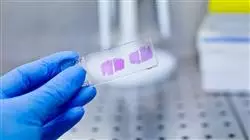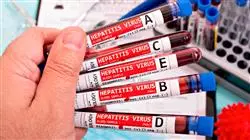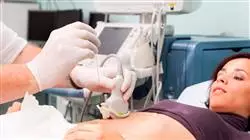University certificate
The world's largest faculty of medicine”
Description
Hepatology is a specialty that has great relevance in medicine, whose latest advances in diagnostic methods require professionals specialized in this medical branch and that can be you”

The development of diagnostic and therapeutic techniques for liver pathologies has turned hepatology into a field of specific knowledge or training (FSK) that is currently in high demand by medical professionals. Hepatology has undergone major changes in recent years. In terms of diagnosis, we have seen the introduction of Ultrasound, Computerized Axial Tomography, Nuclear Magnetic Resonance or FibroScan, among others.
Thus, hepatology has become a specific field of medical praxis, which sometimes exceeds the objectives of digestive system specialists' training period and implies the need for training and, as a result, the existence of trained professionals focused on this specific organ. Therefore, it is essential that the specialist can respond adequately to the evolution of these events through an adequate update of their knowledge and the incorporation of these methodological advances in their daily medical practice, which is why TECH has developed this comprehensive program in response to a highly demanded specialty.
In addition, it is a 100% online postgraduate certificate that provides the student with the ease of being able to study it comfortably, wherever and whenever he/she wants. All you need is a device with internet access to take your career one step further. A modality in line with the current times with all the guarantees to position the medical professional in a highly demanded field.
Identifying the updated diagnostic criteria for liver diseases and develop a correct differential diagnosis strategy will be one of your objectives in this postgraduate certificate"
This postgraduate certificate in Diagnostic Methods and Research Techniques is the most comprehensive and up-to-date educational program on the market. The most important features of the program include:
- More than 80 clinical cases presented by experts in the different specialties. The graphic, schematic, and eminently practical contents with which they are created, provide scientific and practical information on the disciplines that are essential for professional practice
- New diagnoses and treatments for different hepatic pathologies
- Presentation of practical workshops on procedures, diagnosis, and treatment techniques
- An algorithm-based interactive learning system for decision-making in the clinical situations presented throughout the course
- With a special emphasis on evidence-based medicine and research methodologies in the field of hepatology
- All of this will be complemented by theoretical lessons, questions to the expert, debate forums on controversial topics, and individual reflection assignments
- Content that is accessible from any fixed or portable device with an Internet connection
You will establish the pathogenic bases of liver diseases, incorporating the latest advances in the field of study, together with the best professionals in hepatology today”
The program’s teaching staff includes professionals from sector who contribute their work experience to this training program, as well as renowned specialists from leading societies and prestigious universities.
The multimedia content, developed with the latest educational technology, will provide the professional with situated and contextual learning, i.e., a simulated environment that will provide immersive training programmed to train in real situations.
This program is designed around Problem Based Learning, whereby the professional must try to solve the different professional practice situations that arise during the postgraduate certificate. For this purpose, the professional will be assisted by an innovative interactive video system created by renowned and experienced experts.
You will establish the pathogenic bases of liver diseases, incorporating the latest advances in the field of study, together with the best professionals in hepatology today”

You will be able to describe the principles for selecting liver transplant candidates, the surgical basis of transplantation, immunosuppressive drugs, and the short and long-term management of the liver transplant patient”
Objectives
The program of this postgraduate certificate, together with a unique teaching methodology, will allow the student to achieve the proposed objectives, in order to update and delve into the medical branch of hepatology, developing optimal skills in the diagnostic procedures of the different liver diseases. To this end, different medical professionals have poured their knowledge into the development of the points of the study plan, which will provide the professional with a complete perspective and a current approach, with full training for the achievement of his or her academic goal. For this reason, TECH establishes a series of general and specific objectives that the future graduate will master after completing this Universiy Course.

Achieve your goal of specializing in Hepatology thanks to this comprehensive TECH program and boost your career path”
General Objective
- Expand the specialist's knowledge in the management of patients with liver disease, taking into account the latest advances in the field of hepatology, in order to provide quality and safe care and to improve the prognosis of the disease
Specific Objectives
- Identify the updated diagnostic criteria for liver diseases, and develop a correct differential diagnosis strategy
- Establish the pathogenic basis of liver diseases, incorporating the latest advances in the field of study
- Determine the treatment plan for the most prevalent acute and chronic liver diseases
- Describe the principles for selecting liver transplant candidates, the surgical basis of transplantation, immunosuppressive drugs, and the short and long-term management of the liver transplant patient
- Define the rationale, indications, limitations, and cost-effectiveness of diagnostic tests used in Hepatology
- Highlight the impact of the immune system on liver disease
- Explain how to manage patients with chronic hepatitis undergoing antiviral treatment
- Identify the main childhood liver diseases
- Address the diagnosis and treatment of the main hepatic diseases during pregnancy
- Develop a correct differential diagnosis strategy for liver diseases
- Define invasive and non-invasive methods for diagnosing and quantifying fibrosis and their clinical applicability
- Address the imaging diagnosis of cirrhosis, portal hypertension, and hepatic vascular disease
- Describe the clinical utility of MRI cholangiography

In this postgraduate certificate, you will learn to define invasive and non-invasive methods for diagnosing and quantifying fibrosis and their clinical applicability”
Postgraduate Certificate in Diagnostic Methods and Investigative Techniques
Diagnosis is a crucial phase in the medical care of any patient. The use of appropriate and accurate diagnostic techniques can make the difference in the prognosis and treatment of a pathology. Therefore, the Postgraduate Certificate in Diagnostic Methods and Research Techniques is presented as an essential training to address the main diagnostic techniques available today, from the most traditional to the most advanced. You will also delve into the most commonly used research methods, such as biopsy, analysis of laboratory samples or imaging, and their application in different pathologies is addressed.
You will have access to a highly specialized teaching team.
This Postgraduate Certificate in Diagnostic Methods and Research Techniques is taught 100% online, which is a great advantage, since you can access the content from anywhere and at any time, as long as you have an internet connection. This way, you will be able to combine your studies with your daily practice without having to neglect your professional and personal obligations.







